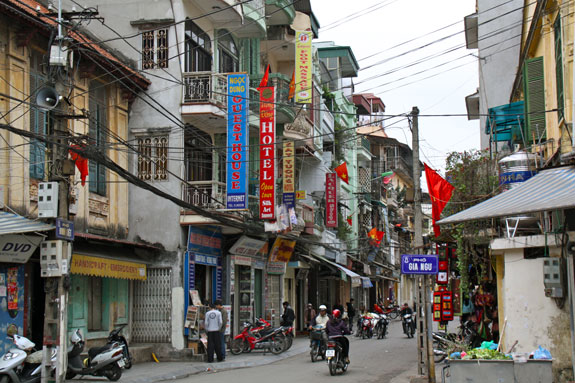Is it even possible for expats to fit in as a local?

Living in a foreign land brings up many unusual situations that people living near where they grew up never have to face. One of these is whether it’s ever really possible to “fit in” and be accepted like the locals accept one another. It’s pretty clear that this is far easier in some places than it is in others, but also that it’s likely never as easy as you might hope before you get there.
This question comes up after reading an interesting essay by an Australian living in Hanoi called “Fear and self-loathing in expat-land.” The writer calls herself a “liberal-minded, politically correct, cultural relativist,” yet she admits that she’ll never really be accepted like she thought she might. Since Vietnam was such a closed society for so long it seems certain that she’ll always have outsider status there, but there’s really nothing wrong or inauthentic about that.
Rethinking racism and name-calling
Having grown up in the United States and then traveling around the world a lot, I think it’s interesting how often it’s either said or implied that “America is a racist country.” People from elsewhere see the Rodney King riots (if they are old enough) or some other more recent example and paint the country as a place where “minorities” are usually treated poorly, or worse.
While there’s certainly been some problems, including some major problems, I think outsiders being treated differently or suspiciously is the norm around the world rather than the exception. It seems that many parts of Western Europe are now dealing with problems that the US went through decades ago, so the worst may be yet to come.
Then you have cultures and countries that have had almost no inbound immigration in the past century, many of which are popular places for expats. It’s been said that Japan is the most racist (or at least race-conscious) nation in the world, and that a foreigner can live there for 50 years and never be fully accepted.
Fortunately it seems that foreigners rarely experience violence in much of the world, but at the same time, having zero chance of really fitting in is less than ideal for many people. Also, there are many other ways foreigners are discriminated against all over the world, including getting constantly overcharged for things by people assuming you are a rich idiot, or being barred from buying property forever.
Is the second generation the key?
This brings us back to the question of whether it’s ever really possible to fit in the way the writer of that essay imagined? She concludes, justfiably so, that it probably isn’t, and that that’s okay. In some places it’s certainly easier than in others, and a person’s ability to learn the local language and customs will have a lot to do with it, but really I think it’s the next generation that can fit right in.
My mother was born in Germany and left that country only about 5 years before I was born in the US (and 3 years before my older brother was born) and we are accepted as 100% American. I think that’s also true of friends of mine whose parents were born in Mexico or China. Still, I see the same thing around the world, again, with the possible exception of Japan where the “half-Japanese” can have great trouble being accepted even when they’ve never ever even left Japan.
Here in Turkey I have friends from the UK who have children who were born here and they seem to be fully accepted as young Turks. So maybe those of us who live abroad will never really be accepted as locals, but our offspring do have that opportunity in addition to being accepted in our country full as well?

You have a point. Even the Irish immigrants was treated poorly when they came to America.
In accepting one may not ever be fully accepted is freeing of expectations. Meanwhile acceptance of the Self with out expectations is freeing. Is what I did during my stay in Spain. To my surprize I was accepted into the fold and hearts of the Spanish.
Honestly, this is the key. And remained that way. Expectations can bring pain. Acceptance frees you, is liberating. This way, if one is not ever accepted, they are not ever hurt. If they push their way onto others or resists, they’ll get hurt.
I’m all for people to be pain free. They have to do this for thes selves for their sake and only if they want to.
This applies to familys too. The egos and dramas created from, for example, competition. There is no competition! But if created, smile, love them and stay on the sidelines so you don’t get drawn out of superficial need of their definition of acceptance.